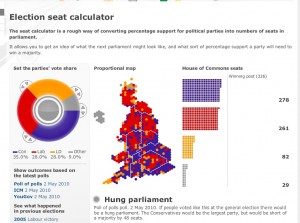Nice, acerbic NYT OpEd piece by A.A. Gill.
These are not three of the most engaging or noble statesmen the nation has produced. Mr. Cameron, the Tory, is personable — your mother would like him. A fresh-faced character who tries, and fails, with emotionally winning oratory. He always sounds like the coxswain urging the rowing team to pull together and straighten their straw boaters.
We look at Nick Clegg, the Liberal Democrat, and try in vain to imagine him going toe-to-toe with leaders like Silvio Berlusconi of Italy, Benjamin Netanyahu of Israel or even the Queen of Tonga. In any other decade, the best he could have hoped for would have been a post as a junior minister in the Foreign and Commonwealth Office, an ambassador’s bag-carrier. He speaks five languages but can’t say boo in any of them. His children all have Spanish names.
Gordon Brown is a character from a tragic opera, twisted by ambition and a Presbyterian sense of fateful destiny. He has waited 13 years, mostly in Tony Blair’s shadow, for this poisoned chalice and has a pessimist’s luck. He wrestles with an Old Testament temper, and it’s said that he has no friends. Certainly, none of them have come out to contradict this. Last week he was recorded by an open microphone petulantly calling a respectable working-class woman he had just spoken to in the street a “bigot.” Off the record, his advisers say they are quite relieved — it’s usually so much worse.


